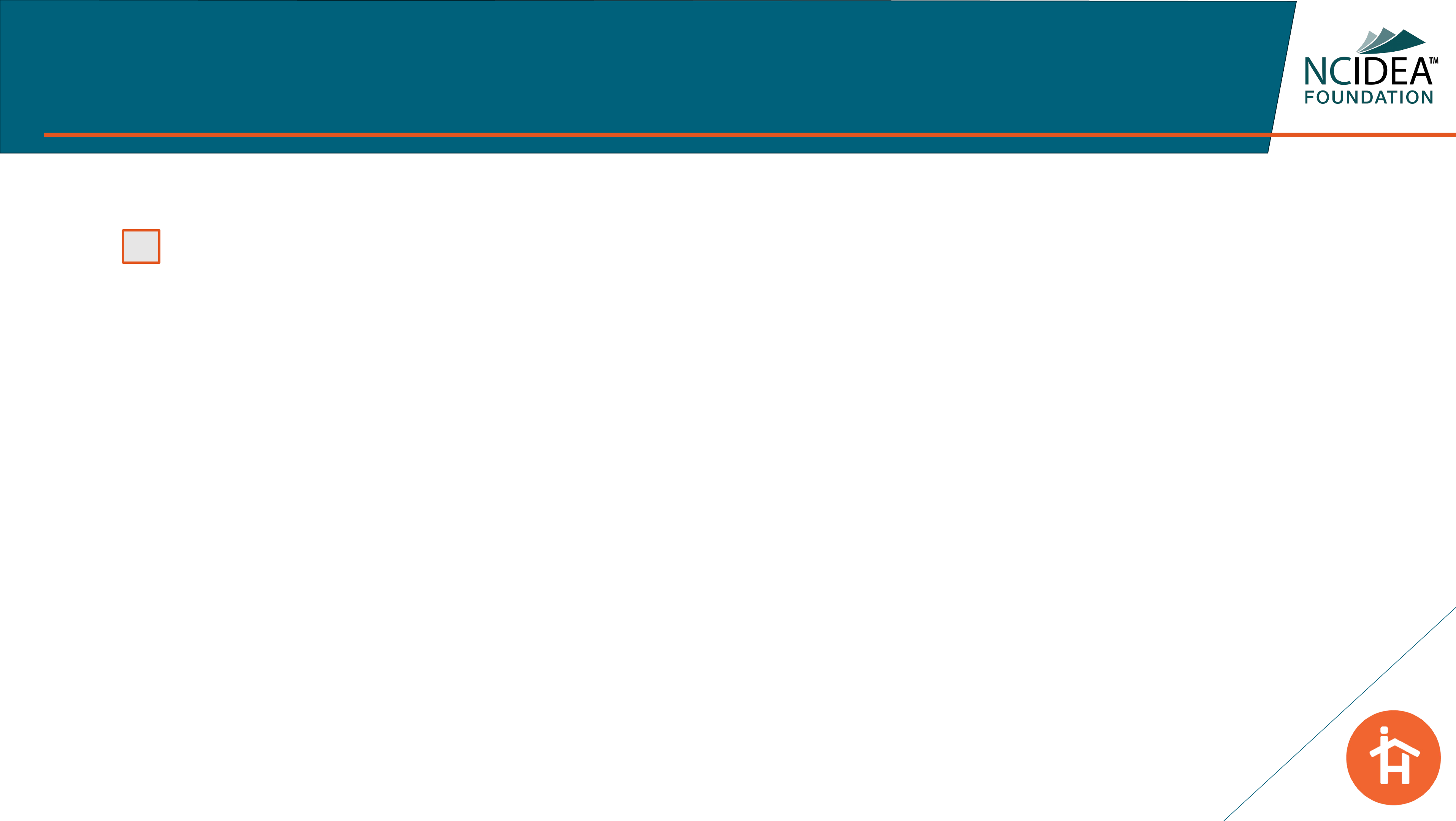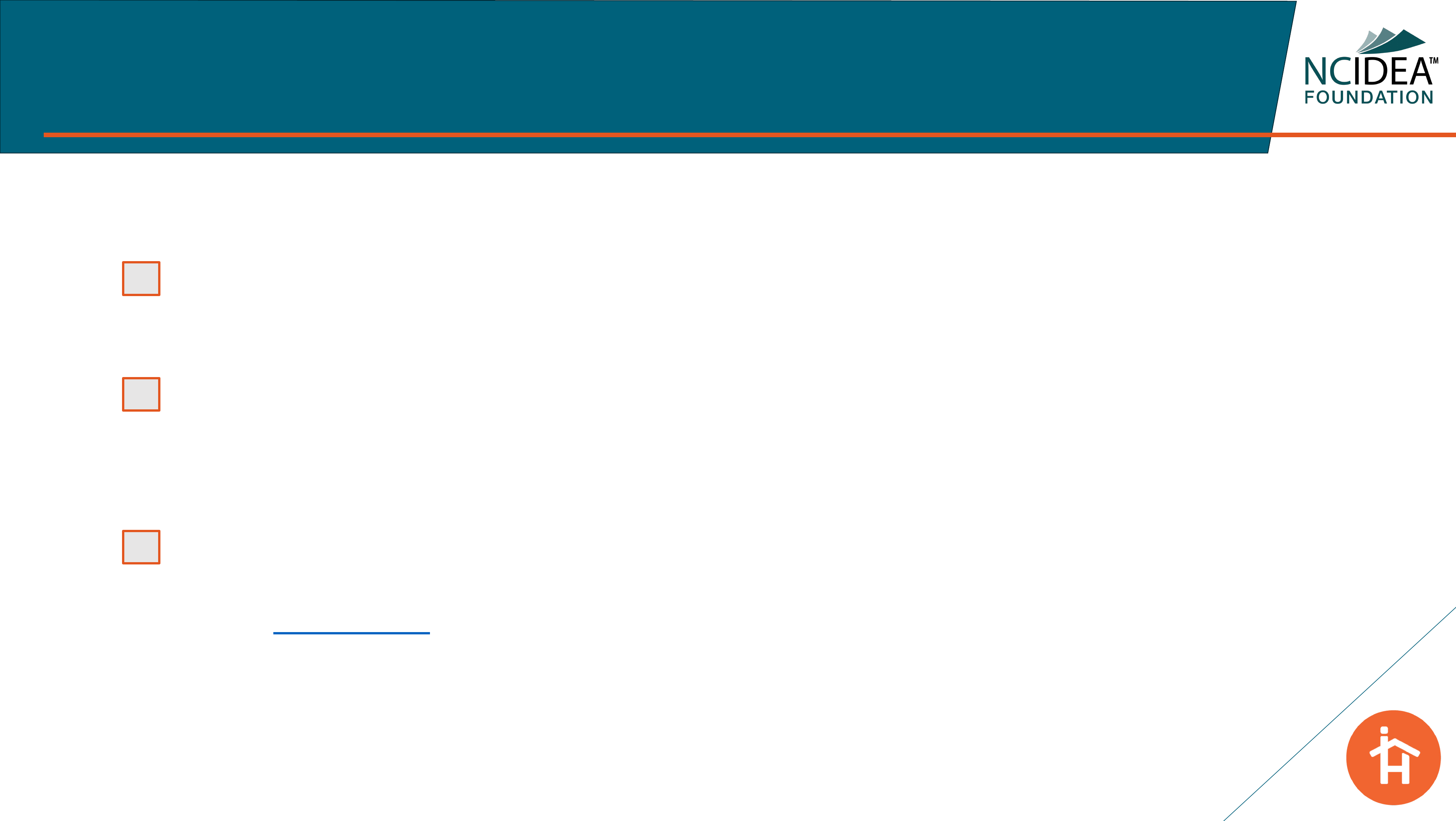
Ice House Entrepreneurship Program
Course Planning Checklist
Updated April 23, 2024

Welcome!
This is a step-by-step guide to planning your next Ice House
course. Included are sections on creating partnerships,
garnering funding, promoting to and registering participants,
planning content, and setting up the LMS. NC IDEA will
update this checklist regularly; please see the footer on the
first slide for the version date.

Section 1
Key terms and definitions

Entrepreneurial Mindset
An entrepreneurial mindset is a way of thinking that
identifies problems as opportunities, using critical
thinking, collaboration, curiosity, and resourcefulness to
craft solutions that bring value to others.
The Ice House Entrepreneurship Program develops an
entrepreneurial mindset - a set of life skills that prepares
anyone, not just entrepreneurs, for success.

Ice House Certification Levels
• Bronze
• completes ELI’s self-paced online program
• Silver
• completes facilitated course
• Gold
• completes facilitator training, with ELI or NC IDEA
• can facilitate a course, graduating participants at silver
• Platinum
• completes expert facilitator training with ELI
• can train facilitators, graduating participants at gold
Each certification has a digital badge, issued by ELI through Accredible.
Must have one of these
certifications to lead an
Ice House course,
regardless of facilitation
or entrepreneurial
support experience

Key Terms

Who’s Involved?
Primary Responsibility
• Finds a meeting space and facilitator
• Secures funding & handles all expenses
• Sets course length & meeting times
• Primarily responsible for marketing
• Handles enrollment
• Orders materials
Leads the Course
• Plans course; creates/customizes slides
• Advises on course length & meeting times
• Supports participant recruitment
• May order materials, with host reimbursement
• Delivers content & facilitates discussion
• Monitors LMS activity
Supports the Host & Facilitator
• Optional but encouraged
• May advise on course length & meeting times
• May provide additional marketing reach
• May provide financial support
• May provide in-kind support

Section 2
Getting started as a host organization

Designing Your Ice House Course
Many details will vary from one class to the next. Before you start, consider:
● The audience you want to serve. How will you connect with them?
● Partners in your community. What could other organizations bring to the
table - meeting space, access to potential participants, etc?
● Where and when will you hold the course?
● How will you fund the course?

Checklist #1: Understanding Your Participants
Are you already connected with your participants?
This is a primary indicator of a course’s success.
What do your participants need to be successful?
● Convenient location; days & times that work with their schedules
● Clear picture of course outcomes
● Format and materials that meet them where they are
● Facilitator who understands their lived experiences
● Other: food, childcare, pitch competition, etc.
Is there existing demand for an Ice House course?
Ask your ready-to-go participants for advice on reaching others and recruit them to help!

Checklist #2: Finding Great Partners
What other organizations serve the participants you want to enroll?
The right partners can help you understand participant needs and amplify marketing eorts.
What organizations could provide in-kind support?
● Small Business Centers (SBCs) have free classroom space. Find your local SBC here.
● NC IDEA and ELI can advise on all aspects of course planning.
● Business owners could visit class as guest entrepreneurs.
● Local businesses may oer free or discounted products/services (such as catering, meeting space, etc.) for promotional purposes.
Who could provide financial support?
● SBCs may cover some costs, such as the facilitator fee, for courses that serve current or aspiring small business owners.
● Civic organizations, such as Rotary, may have available funding.
● Businesses with charitable arms, such as banks, may be willing to sponsor.
● In some cases, participants are charged a nominal fee for “skin in the game.”
● Host organizations are eligible to apply for NC IDEA’s MINDSET grant.

Checklist #3: Creating a Budget
What will you pay your facilitator?
If the facilitator is internal to the host organization, this is often part of their paid position.
Rates for outside facilitators range from $50 to $125 per course hour. (Course hour = time in class; does not include preparation time)
What materials will you provide for your participants?
● All materials are available digitally in the LMS. NC IDEA provides LMS access for each participant.
● Print materials and other optional items are available in the ELI Store.
● We recommend at least buying a physical copy or audiobook of
Who Owns the Ice House?
for each participant.
What other costs will you incur?
Go back to checklist #1 for your participants’ needs. These will vary from one cohort to the next.

Section 3
Planning course logistics and other details

Checklist #4: Selecting the Right Facilitator
Who will facilitate the course? Find a list of NC facilitators here.
How will you split responsibilities/duties between host and facilitator?
Many times, the facilitator is internal to the host organization - if so, you can skip this step!
Otherwise, refer back to slide 7 (Who’s Involved?) for typical division of labor.
Which program version will your facilitator use?
● Original
● Middle School
● Student Success (high school + college)
● Small Business

Checklist #5: Setting the Time and Date
When are your participants most likely to be available and willing to attend?
● Some cohorts have a built-in day and time, such as middle school students, during school.
● One-day classes have low attrition but are challenging for participants to absorb everything.
● Classes that meet once or twice a week give participants opportunity to digest the material, but attrition may be an issue.
● The most eective classes have at least 16 course hours. A class under 4 hours is discouraged.
When are your facilitator and meeting space both available?
How much lead time do you need before the 1st class?
● Some funding, like NC IDEA’s MINDSET grant, require 60 days (or more) advance application.
● Assess how much time you’ll need to market the course.
● If ordering materials from ELI, place your order a week or more before the first class.
○ Allow more time if you’re distributing books before the first class.

Checklist #6: Covering Other Course Details
Create written contracts or MOUs with your partners and facilitator.
Ensure clear delineation of responsibilities and specific deadlines for tasks/duties.
Arrange other course components that your participants need.
● Go back to checklist #1 to review other participant needs.
● The most common “extra” for Ice House courses is
food
. NC IDEA recommends budgeting $10 per participant per 6
course hours. (Example: 20 participants x 12 course hours = $400 for food)
Set up prep meetings, walk throughs, and dry runs as you see fit.
● Plan a tour of the meeting space with your facilitator.
● Gather partners, the facilitator, and other stakeholders as needed.

Checklist #7: Marketing & Enrolling Participants
Decide how participants will enroll.
The host organization may have a system for this already. If not, a simple Google form will work well. You may decide to have two or
more methods of enrollment.
Create and execute a marketing plan.
● Marketing materials, including press release templates and fillable pdf flyers, are here.
● Include partner organizations’ logos on all marketing materials. You can find NC IDEA logos here.
● Share marketing materials with partners to post and distribute.
○ Request marketing support from NC IDEA by sharing info here.
Have a backup plan if enrollment is lower or higher than expected.
● Too few enrollments? Pick up the phone, broaden your target audience, etc.
● Too many enrollments? Start a waitlist for the next course.

Section 4
Facilitator preparation

Planning for Facilitation
The previous two sections (checklists 1-7) are for the
host organization. This section outlines the facilitator’s
responsibilities before the course begins.
Many times, the facilitator works within the host
organization. In that case, all the checklists are for you!
If you are an independent facilitator hired by a host
organization, checklists 8-10 are for you.

Checklist #8: Customizing Your Lesson Plans
Decide what activities for each lesson are best for your cohort.
● The facilitator materials have tons of ideas.
● Additional activities, particularly for middle and high school students (though appropriate for adults, too) are in the Mindset
Matters materials.
Allocate the order and timing of course components.
● It’s best to stay flexible here. Participants will love some discussions and want to keep going. Others won’t land. Be ready to
flow with your cohort’s needs.
● Schedule guest entrepreneurs.
● At minimum, plan to explain and guide participants through the Opportunity Discovery Canvas.
Customize the slides as you see fit.
Decks are in the facilitator materials.
Both NC IDEA and ELI staff can advise on anything on this checklist!

Checklist #9: Setting up the LMS
Request a class setup from ELI.
● Name of institution/organization = host organization
● Name/number of course = only important in schools; use the program name/title that appears in your marketing
● Course edition = the version template you want; you can customize from there
○ Note: If you want Mindset Matters, select “Student Success” then type “Mindset Matters” by “Other” under “Integration Needs” below.
● Will you need a digital copy? = recommended, even if you’re buying books. The LMS is accessible on phones, tablets, etc. This gives your
participants more options to read.
● How will you be purchasing student access? = school/org buying in bulk (more on this in checklist #10)
● Integration needs = teachers and professors, choose your school’s LMS. Everyone else: unless your organization has an internal LMS,
select ELI’s LMS.
● Class list/roster = can be submitted whenever enrollment is closed. In other words, you can skip it for now.
NC IDEA recommends starting this process as early as possible. Give
yourself plenty of time to edit the course exactly the way you want.

Checklist #10: Getting Access Codes
Request LMS access codes from NC IDEA.
● You need one facilitator-led code for each participant.
Submit your class roster to ELI, if you skipped it in the class setup.
● Email a roster with names & emails of all participants to the person at ELI who notified you that your course was ready.
● ELI will provide a list of each participant’s username and initial password.
Share login information with each participant.
● Email each participant with the LMS link, their username + password, and an access code.
● Share these instructions on how to log in the first time.
● Giving participants an opportunity to log in before the first class will allow them to access announcements and materials
(like the book pdf), and it will save valuable class time.

Now prepare for greatness!
Questions?
programs@ncidea.org / info@elimindset.com
